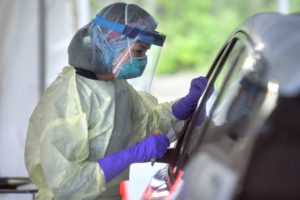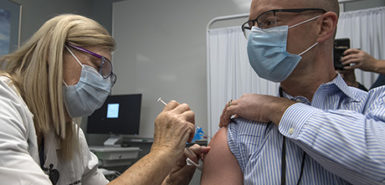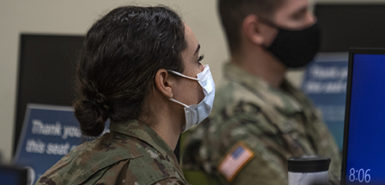
A worrisome rise in COVID-19 cases in recent weeks has resulted in Spectrum Health leaders turning to the community to ask for their help in slowing the spread of the virus.
They’re also making changes within the health care system to care for the community and limit the upward march of cases, Spectrum Health President & CEO Tina Freese Decker said.
In a recent community update, Freese Decker and Darryl Elmouchi, MD, president of Spectrum Health West Michigan, shared an overview of their actions:
- Expanding ICU capacity and dedicating more space to care for patients battling COVID-19.
- Further limiting visitors to keep patients and the community as safe as possible.
- Moving services to outpatient facilities as much as possible and emphasizing curbside and virtual services.
- Deferring some inpatient surgeries that require an overnight stay.
- Prioritizing COVID-19 testing for symptomatic patients. Those exposed to COVID-19 will not be tested based on exposure alone—they must also be symptomatic. Spectrum Health teams are testing about 4,000 people each day.
They reemphasized the critical need for patients, visitors and community members to wear masks as often as possible, maintain a distance of at least 6 feet from others, and wash their hands frequently.
Spectrum Health has seen the number of positive COVID-19 tests increase significantly in the past few weeks, quadrupling from rates seen this past spring.
Hospitalizations from the disease more than tripled in the past three weeks alone, Freese Decker said.
“It’s three-and-a-half times higher than it was last spring,” she said. “It’s eight times higher than just two months ago, in September, when our positivity rate was below 3%.”
The positivity rate is currently averaging above 15%.
About 10% of the patients hospitalized with COVID-19 die from the disease, Freese Decker said.
The spike in positive tests points to a sobering reality: “In the coming weeks, we will see a markedly increased number of patients in our hospitals with COVID-19,” Dr. Elmouchi said.
Other hospitals and health facilities throughout Michigan are experiencing the same exponential increases, Freese Decker said.
“This means we have little opportunity to share clinical staff or transfer patients,” Freese Decker said.
To handle the increased need, plans have already been made to expand as needed for additional treatment space within Spectrum Health’s buildings.
“We’re being very creative and innovative to find those ways to ensure we can take care of people here before we need to expand outside,” Freese Decker said. “That’s our first focus. We know the care we can provide here is high quality.”
The key message from hospital leaders? We need help from the community to reduce the spread of the disease.
“We must change this trajectory of community spread,” Freese Decker said. “We need to flatten this curve like we did this past spring.”
In line with the Centers for Disease Control and Prevention guidelines, Spectrum Health teams are urging community members to celebrate the Thanksgiving holiday with their immediate household only—no extended family, no large gatherings.
This can cut down on the transmission of the virus at a critical time.
“I know that will be hard for everyone,” Dr. Elmouchi said. “But given what we’re seeing here in West Michigan, we are very fearful that if big groups start getting together, the spread will go on even further. I’m hopeful everyone will be able to heed that.”
Spectrum Health is also well-positioned to store and administer COVID-19 vaccinations as they’re rolled out.
“We’re very hopeful that in the coming month, the coming months, we’ll be able to help participate in distributing these vaccines as they become available,” Dr. Elmouchi said.
“We also want to remind everyone that even though a vaccine is on the horizon, it’s not there yet,” he said. “It’s not a cure today. It’s not going to stop what we’re seeing—so we’re really, really emphasizing that everyone needs to do their part.”

 /a>
/a>
 /a>
/a>
 /a>
/a>